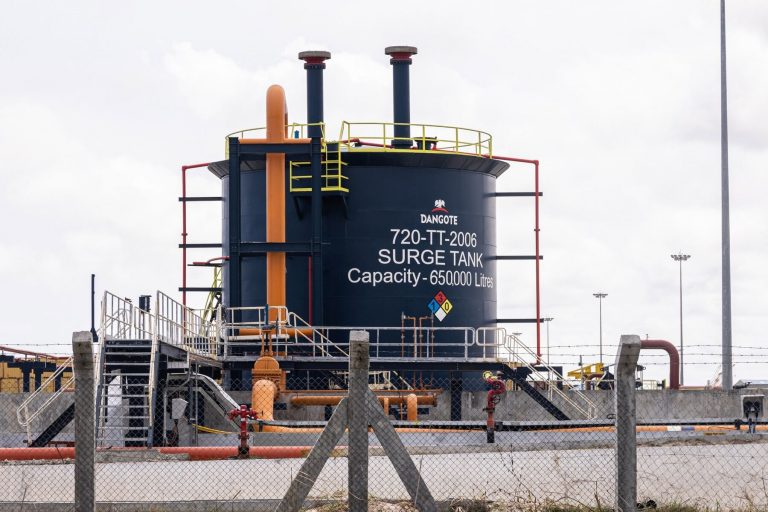
The recent agreement between the Independent Petroleum Marketers Association of Nigeria (IPMAN) and Dangote Refinery marks a transformative shift in Nigeria’s oil sector, aiming to establish a more open, competitive market with widespread fuel availability nationwide.
This direct supply partnership, announced by IPMAN National President Abubakar Garima in Abuja, on Monday, allows Nigeria’s independent petroleum marketers to lift premium motor spirit (PMS), diesel, and other products directly from the Dangote Refinery, bypassing the Nigerian National Petroleum Corporation Limited (NNPCL) as the sole distributor.
The impact of this development is expected to be far-reaching, addressing supply constraints, improving affordability, and gradually ending Nigeria’s longstanding dependence on costly fuel imports.
Tekedia Mini-MBA edition 16 (Feb 10 – May 3, 2025) opens registrations; register today for early bird discounts.
Tekedia AI in Business Masterclass opens registrations here.
Join Tekedia Capital Syndicate and invest in Africa’s finest startups here.
Garima stated that this arrangement came after an IPMAN meeting with Dangote and his management team, emphasizing that the collaboration would benefit both Nigerian consumers and the national economy. The agreement follows a notable shift in the Nigerian National Petroleum Corporation’s (NNPC) position, as it recently suspended its intent to act as the exclusive buyer of products from the refinery, which has a capacity of 650,000 barrels per day (bpd).
Highlighting the advantages of domestic refining, Garima encouraged IPMAN members to prioritize purchasing from Dangote Refinery and Nigerian refineries. Garima noted that the refinery’s backward integration could significantly ease pressure on Nigeria’s foreign exchange market, with potential benefits for the broader economy.
Garima expressed optimism that the partnership would result in favorable pricing, although specific prices for IPMAN members remain undisclosed. The agreement aims to reduce dependency on intermediaries, which is expected to enhance efficiency, lower distribution costs, and ensure product affordability for Nigerian consumers.
This move is set to have a considerable impact on the country’s over 30,000 IPMAN members and its extensive network of 150,000 retail outlets, aiming to provide a consistent supply chain that serves both urban and rural areas.
In line with ongoing efforts to diversify Nigeria’s energy mix, Garima confirmed that IPMAN is preparing to establish CNG refill stations nationwide. This initiative is being done in collaboration with the federal government to support infrastructure development and offer incentives to accelerate CNG adoption. He encouraged IPMAN members to embrace CNG as a viable alternative, highlighting its potential to drive long-term economic growth and energy security.
Transforming Nigeria’s Oil Sector Toward a Free Market
For years, Nigeria’s oil sector has grappled with import dependency and a centralized distribution model, which has often led to supply disruptions, high distribution costs, and limited retail access to fuel, particularly in remote regions. IPMAN’s collaboration with Dangote Refinery represents a critical step toward a more liberalized and efficient oil market that prioritizes direct supply, increased availability, and market-driven pricing.
With over 30,000 IPMAN-affiliated retail stations across Nigeria, this new agreement promises to bolster accessibility, improve pricing stability, and, most importantly, mitigate supply shortages that have historically plagued the country.
This agreement follows NNPC’s decision to halt its status as the sole off-taker of petroleum products from Dangote’s 650,000-barrel-per-day (bpd) refinery, a move which aligns with the Tinubu administration’s vision for a freer market structure within the oil and gas sector.
Eliminating Financing and Margin Mark-Ups
Kelvin Emmanuel, an energy expert, expressed optimism about the cost reduction this shift could bring, explaining that IPMAN’s transition to sourcing directly from Dangote Refinery would reduce additional costs tied to NNPCL’s previous distribution model.
“What is cheering about this news is that NNPC’s letter of credit as financing cost ($28 per metric tonne) that is passed to IPMAN — controlling 30k+ retail stations and their margin ($26.48 per metric tonne) will be removed. Baby step,” Emmanuel stated.
Previously, NNPCL’s role as a middleman between Dangote Refinery and IPMAN came with notable financing costs and a margin that contributed to elevated fuel prices across the country. These expenses, totaling over $54 per metric tonne, often translated into higher pump prices for end consumers. By eliminating these additional costs, IPMAN’s new partnership with Dangote is projected to not only improve the affordability of fuel but also foster greater pricing transparency within Nigeria’s energy market.
Also, the NNPC has announced its withdrawal from importing fuel, to source from Dangote Refinery. Addressing an audience at the Nigerian Association of Petroleum Explorationists (NAPE) conference in Lagos, NNPCL Group Chief Executive Officer Mele Kyari disclosed that NNPCL had ended its importation of refined fuel, a decision that could save the Nigerian government trillions of naira annually.
He stated, “Today, NNPC does not import any product, we are taking only from domestic refineries,” underscoring the corporation’s strategic pivot toward supporting local refining capacities.
With the $19 billion Dangote Refinery and Nigerian refineries stepping in to fulfill national fuel needs, the Nigerian government is expected to potentially save up to N24 trillion in fuel importation costs over time.
“Our goal,” Kyari stated, “is to achieve energy self-sufficiency and provide accessible, affordable fuel to Nigerians.”
This landmark development signals a new era for Nigeria’s petroleum industry, one in which independent marketers have a stronger role, fuel supply is stabilized, and consumers benefit from a competitive market structure. As the IPMAN-Dangote partnership unfolds, stakeholders are optimistic that Nigeria’s oil sector will move closer to achieving self-sufficiency, affordability, and a robust foundation for future energy developments.



